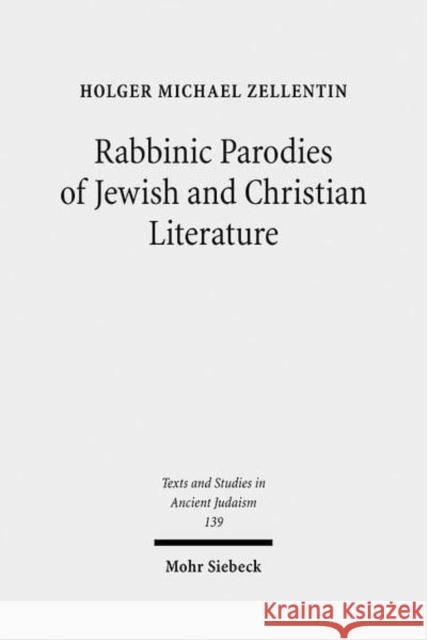Rabbinic Parodies of Jewish and Christian Literature » książka
Rabbinic Parodies of Jewish and Christian Literature
ISBN-13: 9783161506475 / Angielski / Twarda / 2011 / 275 str.
Holger M. Zellentin seeks to probe how far the classical rabbis took their literary playfulness in order to advance their religious and societal causes. Building on the literary approaches to rabbinic Judaism of the past decades, this work considers the rabbis' attitudes towards their Byzantine and Sassanian surroundings. The author examines how the Talmud and Midrash in Palestine and Persia repeat previous texts with comical difference, oscillating between reverence and satire. The result shows rabbinic society and its literature engaging in the great debates of their times, commenting on issues such as pedagogy, abstinence, dream interpretation, inheritance law, ritual purity, and Christian triumphalism and asceticism. In constant conversation with the Bible, the rabbis reveal themselves as capable of critically reinventing the Jewish tradition, as well as of playfully engaging a few Gospel passages favoured by their Christian interlocutors. Rabbinic parodies cast deviant insiders as tantamount to outsiders and explore the limits of acculturation within the Jewish tradition - in the Talmud, even parody itself comes under parodic scrutiny.
Do the Talmud and Midrash engage in parody? Holger M. Zellentinseeks to assess how the classical rabbis imitate previous texts with comical difference. The result shows rabbinic society and its literature participating confidently in the great debates of the Byzantine and the Sasanian Empires, commenting on issues such as pedagogy, abstinence, dream interpretation, inheritance law, ritual purity, and Christian supersessionism and asceticism. In constant conversation with the Hebrew Bible, the rabbis reveal themselves as capable of critically reinventing the Jewish tradition, as well as of playfully engaging select Gospel passages favoured by their Christian interlocutors.











